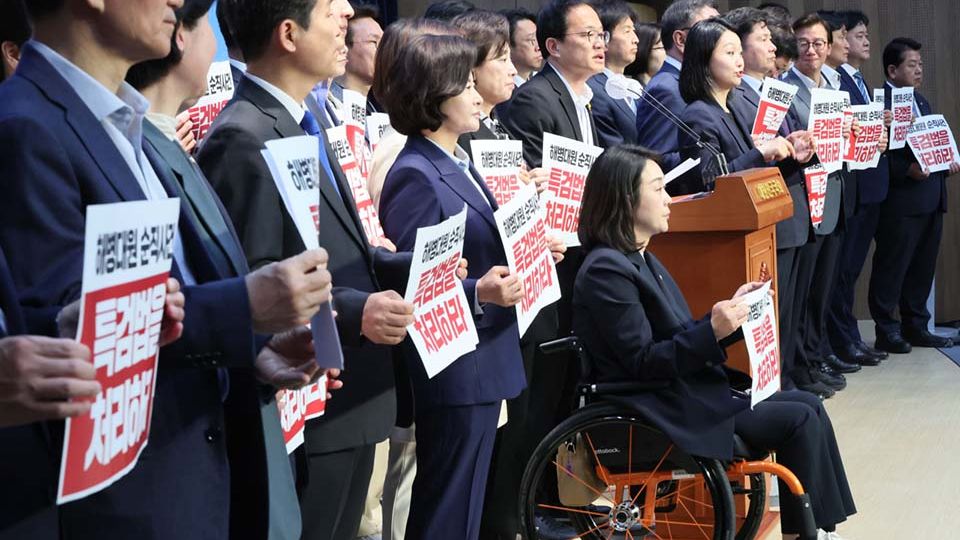April 16, 2024
SEOUL – The main opposition party’s attack on President Yoon Suk Yeol intensified on Monday, while his approval rating took the biggest weekly plunge since July 2022 in the wake of a crushing election defeat.
With the 21st session of the National Assembly set to end its four-year lifetime in about 1 1/2 months, the main opposition Democratic Party of Korea doubled down on the besieged Yoon administration’s political vulnerability.
The party demanded that the National Assembly pass a bill calling for a special counsel probe into the Yoon administration and the presidential office’s alleged interference in an investigation regarding Marine Cpl. Chae Su-geun’s death during a search and rescue operation into a flooded area in July 2023.
The lawmakers of the Democratic Party and its satellite Democratic United Party, who currently hold a simple majority combined in the National Assembly, said they will do so in the next four-year term of the parliament, following Wednesday’s victory.
Rep. Park Ju-min of the Democratic Party, a two-term lawmaker, said together with the 115 of his fellow party’s lawmakers who participated in a press briefing at the National Assembly, that the 21st session of the National Assembly “must pass the special investigation bill into the Marine Cpl. Chae case.”
Park, who will begin his third term in late May following Wednesday’s victory in his constituency in Seoul, added that Yoon will “also be targeted” in the special counsel’s probe.
Park called for the ruling People Power Party’s cooperation in passing the bill, saying the ruling party would otherwise “face greater consequences than the election defeat.”
The bill does not technically need any vote support from the ruling party to pass, but it would need ruling party votes to override a presidential veto.
Park said in a radio interview Monday that his party hoped to pass the bill in early May.
This has come nearly two weeks after the special counsel bill was proposed in the plenary session of the parliament, after the opposition bloc’s 181 lawmakers voted in favor of fast-tracking the bill in October.
If passed, the bill is expected to give the opposition parties the power to recommend candidates for the special counsel position. The special counsel will explore whether there was any intervention by external forces when it comes to the Defense Ministry’s internal probe into the cause of Chae’s death in July. Chae lacked safety equipment when he was ordered to participate in the operation and was swept away by an overflowing stream.
The controversy boils down to whether Yoon’s office had interfered in the Marine Corps’ internal probe that held high-ranking officials accountable, and used its power to steer clear of their legal trouble.
Initially, eight high-ranking officials including the then-commander of the 1st Marine Division were held responsible for the Marine soldier’s death, according to the internal probe in July. But then-Defense Minister Lee Jong-sup revoked his approval of the probe result. The government later dismissed the then-chief investigator of the Marine Corps and indicted him for disobedience.
Yoon’s office has not clearly articulated why his administration had stepped in to contradict the inspection result.
Lee resigned from his post as opposition parties’ attacks intensified and his interference allegations snowballed. Months later, Yoon’s office named Lee as the ambassador to Australia and its administration used its authority to clear Lee of a travel ban to make him eligible to become the top envoy to Australia. Amid protests, Lee resigned 25 days after the nomination.
Rep. Cho Kyoung-tae of the People Power Party said in a radio interview Monday that the controversies surrounding Marine Cpl. Chae’s death and Lee’s alleged involvement in altering the probe result “had affected the election outcome,” adding that now is the time to “show that the ruling party and the government humbly accept the defeat.”
With the opposition bloc still holding a simple majority, the bill is likely to at least make it to presidential office. However, Yoon has the power to veto any bill. The opposition bloc does not occupy enough seats — two-thirds of the parliament or 200 seats — to override the veto in a revote on its own.
If Yoon vetoes the bill, it will be the 10th time he has done since his term began less than two years ago.
Meanwhile, Yoon’s popularity has taken a big plunge.
According to a poll by Realmeter released Monday, Yoon’s approval rating on the second week of April — when the legislative election was held — fell to 32.6 percent, down by 4.7 percentage points from the previous week. It was the biggest weekly drop since July 2022, just two months after Yoon was inaugurated.
The poll also suggested that Yoon’s popularity on Friday hit the lowest point of 28.2 percent.
In the meantime, Yoon is beset by opposition leaders’ demands to hold talks, which Yoon refused in an unprecedented fashion.
On Friday, Rep. Lee Jae-myung, chair of the Democratic Party, demanded that Yoon accept his request to hold talks with him, as he visited the National Cemetery in Seoul Friday with the lawmaker-elects of the party.
Yoon has not held any official one-on-one meeting with main opposition leader Lee since taking the oath of office in May 2022. Yoon is the only South Korean President since its transition to democracy in 1988 who has failed to meet the main opposition leader in the first 112 days or longer in office.
Lee’s request was followed by that of Cho Kuk, one of the 12 lawmaker-elects of the new minor opposition Rebuilding Korea Party. Cho, Yoon’s longtime political opponent, a former justice minister and senior presidential secretary for civil affairs in the Moon administration, called for an open discussion with Yoon in a post on his Facebook page Sunday.


